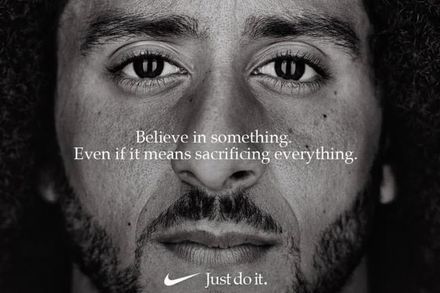Nike’s latest marketing strategy sparks major debate
September 18, 2018
Colin Kaepernick is the new face of Nike, but the change has not settled well with some of Nike’s customers.
Former NFL quarterback for the San Francisco 49ers, Colin Kaepernick, sparked up controversy when he refused to stand for the national anthem before a preseason game back in August of 2016.
“I am not going to stand up to show pride in a flag for a country that oppresses black people and people of color. To me, this is bigger than football and it would be selfish on my part to look the other way,” Kaepernick said in an interview with NFL media.
Although Kaepernick’s protesting was silent, his message was heard by the nation. Soon after the protest made the news, many athletes of different sports joined him in the stance, resulting in a new hot topic in politics. President Trump even suggested that all kneeling players in the NFL should be fired during a September rally in Alabama.
Nike announced Kaepernick as the new face of their notorious “Just do it” ad campaign Sept. 5, 2018. There was an avalanche of backlash toward Nike for this decision. Some supported the decision, and some reacted negatively to the ad.
The negative backlash came mostly from individuals who don’t support Kaepernick’s political views, and most of it began with him kneeling for the national anthem in 2016. Some agree with President Trump that the ad sends a “terrible message,” while others think differently.
“Having a huge company back him … could be a controversial reason for this company, but they’re not afraid. I feel like that was a really powerful statement to a lot of other companies,” Serena Williams said in an interview with the Washington Post.
Those who oppose Nike’s ideas have taken things into physical matters of protest. Videos of protestors burning their Nike apparel, throwing Nike shoes into fire pits or shredding Nike socks, shirts and shorts have have gone viral on social media.
“I don’t really see a point in burning Nike apparel. They already gave Nike their money by purchasing their items, so I’m sure Nike is not too worried about it,” Seth Alston, a freshman at Washburn University, said.
With the hashtag #BoycottNike circulating twitter, controversy over the ad and protests against the brand exploded. Many thought Nike’s sales were going to drop, but they actually increased by 31 percent.
“Nike has a history of positioning itself as a progressive company. They have advocated for other social causes such as AIDS, gender equality and those with disabilities. In this case they appear to be positioning themselves as the brand that stands up against the establishment. Controversial figures create a lot of hype, and the provocative figure of Colin Kaepernick generates a national if not global conversation about the brand,” David Price, marketing professor of Washburn University, said.
To many peoples’ surprise, Nikes sales increased after the ad, and it left many wondering how they did it.
“Nike’s target market, which is mostly skewed towards a younger generation, are more supportive of Kaepernick’s activism than others,” Price said. “YouGov market research firm found that, when compared to the general public, more Nike customers have a positive view of Kaepernick and believe that a company should take a stand on social issues and have a “moral message.” Nike’s position may not sell to older conservatives, but they are not the biggest buyers of their products, are they? I don’t see President Trump getting around in Nike sneakers…”
Although Nike’s online sales increased, the company has experienced a small decline in the amount of companies that support them. Several companies and institutions, such as Liberty University, have denounced their support for Nike. President Donald Trump has also voiced his disapproval of the ad.
As time goes by, more and more companies are vocalizing their political beliefs, whether the vast majority of people agree with what they say or don’t. As professor Clark from the York University’s Schulich School of Business said, “Bland brands fade away.”



